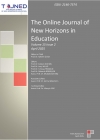TOJNED - Volume 2 - Issue 4 - October 2012
 A History of Multicultural Education in the USA: Origins, Approaches, and Misconceptions
A History of Multicultural Education in the USA: Origins, Approaches, and Misconceptions Rasit Celik
Abstract: Multicultural education has been an important element of the curriculum in the USA, especially since the second half of the twentieth century. However, there is no common consensus on its meaning and aims among the scholars of multicultural education. This study aims to provide readers with some major scholars important but different analysis of multicultural education in the USA, with respect to the origins of and approaches to multicultural education. Even though various misconceptions about multicultural education thwart its development, its historical progress suggests that multicultural education has expanded its scope in accordance with the common understanding of equality and social justice, which suggests that multicultural education is to be an essential part of education system in pluralistic societies.
 An Analysis of Turkish Pre-Service Physics Teachers Discussions of Learning Objectives of Secondary School Physics Programme of Study
An Analysis of Turkish Pre-Service Physics Teachers Discussions of Learning Objectives of Secondary School Physics Programme of Study M. Şahin Bülbül, Ufuk Yıldırım
Abstract: This study focuses on the perceptions of pre-service physics teachers about the learning objectives of the secondary school physics programme of study. Data were collected from pre-service physics teachers attending a compulsory course named Instructional Planning and Evaluation in Secondary Education. Pre-service teachers online discussions as contributions to the preparation of an assignment for the course comprised the data for the study. Results showed that preservice teachers had difficulty in identifying and deciding level according the Bloom s taxonomy of higher order learning objectives whereas they easily identified learning objectives from knowledge, comprehension and application levels. Keywords: physics programme, learning objectives, Bloom s hierarchical model
 Problems Faced By Information Technology Teachers in Schools at High School Level and Solutions to Such Problems
Problems Faced By Information Technology Teachers in Schools at High School Level and Solutions to Such Problems Gökmen Dağlı, Behçet Öznacar
Abstract: In the century that we live in, information has become one of the resources that are being produced, changing hands and being consumed rapidly. In the present time, in order to be able to move ahead as a society, proper education is required to be provided in our schools. In the general sense, there is a consensus that information and communication technologies are beneficial as a basic requirement of the era the education and that they should be used. The purpose of this study is to identify the problems of information technology teachers working in the schools in the TRNC, which result from institutions and individuals and to conduct studies in order to suggest alternative ways for the solution of those problems. In conclusion, it has been identified that the leading problem among all those faced by teachers with respect to the use of information technologies in the TRNC is lack of technical infrastructure.
 Science and Technology Teachers Opinions Regarding the Usage of Zoos in Science Teaching
Science and Technology Teachers Opinions Regarding the Usage of Zoos in Science Teaching Melike Yavuz, Fatime Balkan Kıyıcı
Abstract: In this study it was aimed to investigate the science and technology teacher opinions regarding using zoos which are one of the out of school learning environments, as an educational resource in science teaching. For this purpose, a qualitative data was obtained by semistructured interviews in order to resolve the problem. Study group which was selected with purposeful sampling strategy was composed 36 science and technology teachers who works in Gölcük which is a district in the province of Kocaeli. The study was conducted in 2011-2012 academic year. In this study as a data collection instrument, semistructured interviews were conducted with teachers in order to obtain their conceptions regarding the current status of zoos in science teaching. For analysis of data collected through semi-structured interviews, content analysis technique was used. As a result of interviews conducted with teachers, it was emerged teachers can bennefit from zoos in education and training activities that are related to science and technology course curriculum. Meanwhile, they have stated the contribution of zoos to education by emphasizing the positive effects of zoos on students cognitive and affective characteristics. The results of this study in which science and technology teachers opinions were evaluated, presented findings regarding the usage of zoos as an educational resourse to promote science teaching in Turkey and contributed to the literature.
 The Analysis of Ict Skill Levels of Foreign Language Instructors Working At Universities
The Analysis of Ict Skill Levels of Foreign Language Instructors Working At Universities Elif Kır, Selda Kayak
Abstract: This study was carried out in order to determine the ICT skill levels of the lecturers working at the foreign languages schools of the universities. The data collection tool of study was the ICT4LT (Information and Communications Technology for Language Teachers) developed by Davis (2008). The tool was restructured by the researchers upon receiving comments from the experts, candidate teachers for English and Computer and Instructional Technology. 40 lecturers among the ones employed at 4 different universities in Ä°stanbul participated in the study. The data was examined by age, gender, lecturers seniority and whether or not they took an ICT course. Moreover, the general average and the average of every sub-factor were calculated. Some suggestions were made according to the results of the study.
 The Influence of the War in Cyprus on Turkish Cypriot Families
The Influence of the War in Cyprus on Turkish Cypriot Families Gülen Uygarer, Sibel Dincyurek
Abstract: In this ethnographic research, Akım Family was used to investigate the influence of the Cyprus conflict on Turkish Cypriot families and to find out about their significant problems and living conditions in those days. Data was collected through the use of ethnographic interviews. Data results reveal that major difficulties were faced at the time of war and the effect of these difficulties on the Cypriot families was great


